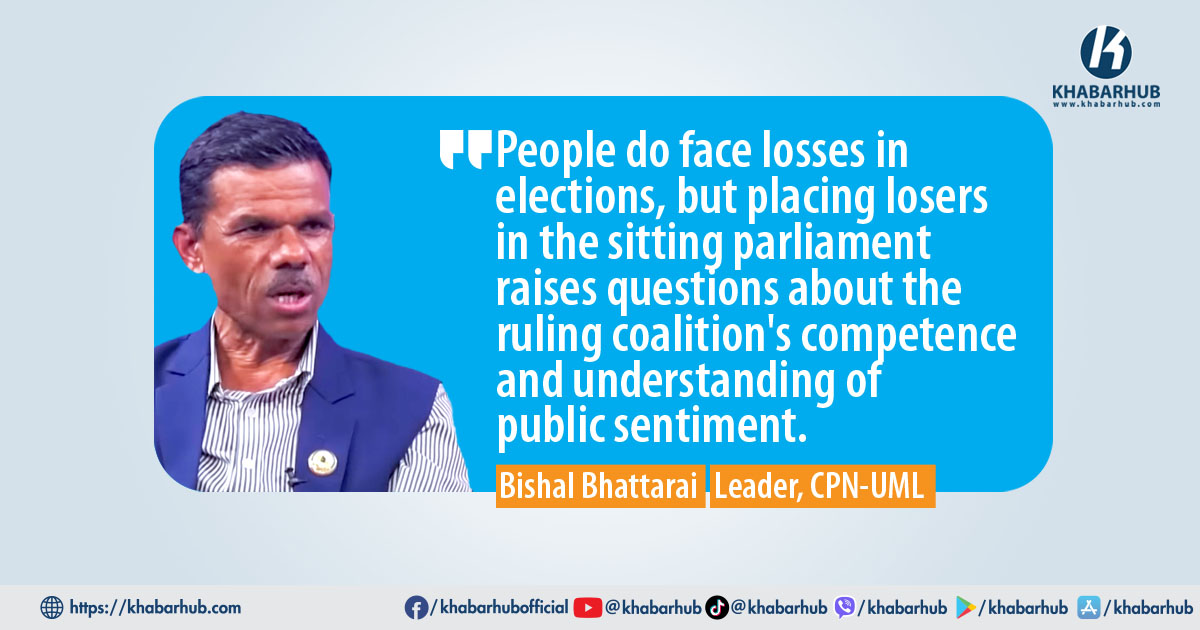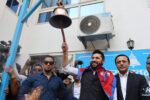KATHMANDU: CPN-UML leader Bishal Bhattarai openly admitted that the decision to nominate Bamdev Gautam, who lost in the parliamentary elections, to the National Assembly was a mistake.
Bhattarai urged a reevaluation of the electoral system and provincial structure, emphasizing the need for a more robust approach in an interview with Khabarhub.
Bhattarai expressed his discontent with the current political landscape, citing the alliance between ruling parties and the UML as a result of apprehensions about facing the National Assembly elections independently.
He also criticized the alliance with Rastriya Prajatantra Party (RPP), branding it as lacking in principles.
Highlighting the prevailing disappointment among the public due to the behavior of ruling parties, Bhattarai asserted the CPN-UML’s commitment to federalism, secularism, and the republic.
However, he proposed a thorough reconsideration of the electoral system and provincial configuration.
In his opinion, the House of Representatives’ election should move away from a proportional representation system and adopt a more direct approach.
This edited excerpt captures UML leader Bhattarai’s insights on the National Assembly elections and contemporary politics, shedding light on his call for a comprehensive review of the electoral framework and regional dynamics.
CPN-UML is facing a decline from being the largest party in the National Assembly. What is the strategy of UML now?
We consider the National Assembly as a certified house of the Federal Parliament, playing a crucial role in ‘checks and balances’ with the House of Representatives.
Our presence in the National Assembly is strong. The ruling coalition fears facing the elections alone, anticipating UML’s potential to win all seats.
There are reports of alliances forming in some provinces, including with RPP, and in response, UML is gearing up for fierce competition.
We’ve strategically selected candidates across the board and are determined to win.
Currently, the House of Representatives drafts laws, and individuals like Krishna Sitaula and Durga Paudel from the Advisory Council reject them. What are your thoughts on this?
Such actions are highly unethical. The National Assembly’s role in pacifying legislation was disregarded, disrespecting the institution.
Bringing individuals defeated in the House of Representatives to the National Assembly compromises its integrity.
People do face losses in elections, but placing losers in the sitting parliament raises questions about the ruling coalition’s competence and understanding of public sentiment.
Disappointment among the public is evident, and doubts are emerging about the current system, the republic, and the democracy we’ve strived for.
The coalition’s actions, expressing dissatisfaction and attempting to undermine the system, only add to the frustration.
Has the agitation within the National Assembly, going beyond the Constitution’s intent, started with the nomination of Bamdev Gautam, who was defeated in the parliamentary election?
Bamdev Gautam was in our party at that time, but we did not push for his nomination.
He went there from a quota nominated by the President.
We believe it was a personal decision and did not contribute to the National Assembly’s respect.
Despite our reservations, he was nominated by the President.
Repeating such a mistake is inappropriate, especially at a time when people are extremely disappointed.
Timely decisions are essential, and undermining the system further is not ethical.
In Koshi, you collaborated with the Shekhar Koirala group of Nepali Congress, and RPP. CPN-UML must have reviewed the kind of politics you are engaged in. What are your insights?
They are not united due to our wrong actions; rather, they have come together based on the fundamental belief that UML cannot be defeated alone.
This situation persists. If we were to confront them independently in the National Assembly, UML’s esteemed position would prevail.
They hesitate to face the battle solo and have formed alliances across various sectors, including doctors, professors, journalists, engineers, and cooperatives, from the ward level to the presidency.
It seems that not only within the country but foreign powers also play a significant role. What is your take on this?
Absolutely. Foreign powers exert influence, as high-level leaders reveal.
When leaders start receiving calls in Hindi and English, it becomes evident that external forces are at play, whether in the Koshi Province or elsewhere.
Instances like the torn Citizenship Bill, rejected by the President but disregarded during the Prime Minister’s visit to India, or the lack of awareness and response when Narendra Modi holds a parade on our land, showcase how we are entangled in external matters.
There seems to be a desire to keep KP Oli away, making neighbors more compliant to external directives.
We, as UML, adhere to moral values in our politics. Our unity is built on these fundamental principles.
However, there’s a mix of those advocating for a return to monarchy and those aiming to abolish federalism.
Some even express desires to end democracy and secularism. It’s a force driven more by fear than a coherent agenda, gathering together for power and position.
Therefore, breaking this unprincipled alliance, UML will forge ahead in the days to come.
Losing a seat or two holds little significance for UML, with a political history spanning 75 years.
We are on a journey of social change, carrying the dream of a prosperous Nepal. We are resolute in realizing this dream with a focus on social transformation.
The current political landscape seems to lack ideas, debates, programs, trust, and principles, giving rise to what commentators describe as a stagnant form of politics. Meanwhile, those opposing the system are organizing themselves. Is their influence expanding?
Indeed, attempts are being made to portray political parties as indistinguishable entities.
UML, however, strives to maintain its distinct identity. Despite the fundamental achievements we have secured, it is crucial to reconsider the electoral system and provincial structure.
While others may shift their stance on republic, democracy, and secularism, CPN-UML’s principles and language remain unwavering.
Reflecting on past events, when neighbors imposed a blockade during the constitution-making period, different parties responded in various ways. Can you shed light on UML’s approach during that challenging time?
When our party Chairman held the position of Prime Minister, he vehemently protested the blockade, standing firmly in the lion palace, rather than opting for opposition.
We engaged in mapping our lost territories, forged trade agreements with China, and developed blueprints for the country’s prosperity.
However, despite a commendable economic growth rate and resilience during the Covid pandemic, the current economic situation is dire.
Revenue remains stagnant, and capital expenditure is at a mere 12%.
The dissatisfaction stems from the weakening of the nation’s overall condition since the formation of the alliance.
What, in your view, is the primary cause of the current dissatisfaction?
The entire system is now under scrutiny. Calls to abolish the republic, reinstate a monarchy, and remove democracy suggest a regression towards the Panchayat era.
Reassessing the proportional election system introduced post the people’s movement of ‘2062/’63 is crucial.
Moving towards direct elections for the House of Representatives could prevent manipulation, creating a more transparent political landscape.
The current system, where the number of seats won dictates ministerial and prime ministerial positions, also requires reconsideration.
How does UML propose to address the concerns related to federalism and the provincial structure?
We advocate for our original federalism and recognize the challenges posed by the current provincial structure.
It is imperative to address the issues raised by the public and contemplate possible reforms.
UML is prepared to take proactive measures to address these concerns until the next election, given that this system was established through the sacrifices of many.
Is UML willing to form alliances for votes, or is it committed to preserving its distinct identity?
In order to protect the system established through the sacrifices of many, CPN-UML is unwavering in its commitment.
We are not inclined to join hands with anyone merely for votes; our focus is on safeguarding the principles and integrity of our party.
People often say that the system was established through the sacrifice of thousands, but it seems to have become a tool for the management of a few. How do you view this?
It’s essential to acknowledge that the system isn’t flawless. The remnants of the old state system and ingrained habits persist, hindering our progress.
Our sense of nationalism has not seen significant improvement, even as citizen awareness has grown.
There’s a concerning trend of irresponsible behavior, especially on social media and in the media, where everyone except oneself is deemed more competent.
Citizens need to be conscious of the developmental strides made by other countries.
Living abroad, some individuals tend to criticize their homeland instead of fostering a sense of belonging.
It’s crucial that citizens develop the conviction that this country is theirs, regardless of where they reside.
Can the citizens be held accountable when there’s a disparity in the application of laws between those in leadership positions and those below them?
Certainly, there’s a need for an awakening among both leaders and citizens.
Leaders who abide by the law should take the responsibility of encouraging others to do the same.
However, there’s a prevalent mindset from leadership to citizens that others should perform better, and this needs to change through a collective awakening.
While some go abroad out of choice and others out of necessity, cursing the country from afar is counterproductive. Instead, fostering the sentiment that the country is truly theirs is vital.
There are evident areas that require improvement, leading to dissatisfaction among citizens. How can the right political party address these concerns and protect the system?
It’s true that there are areas that need improvement, causing discontent among citizens.
The right political party, through appropriate actions and initiatives, can safeguard and develop the system. It’s crucial not to succumb to despair and believe that nobody possesses the ability to build a better country.
The key lies in political parties selecting capable representatives and collectively working towards the development and prosperity of the nation. There is no alternative path.









Comment